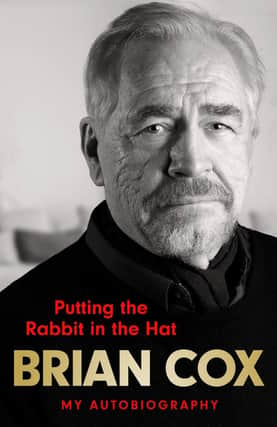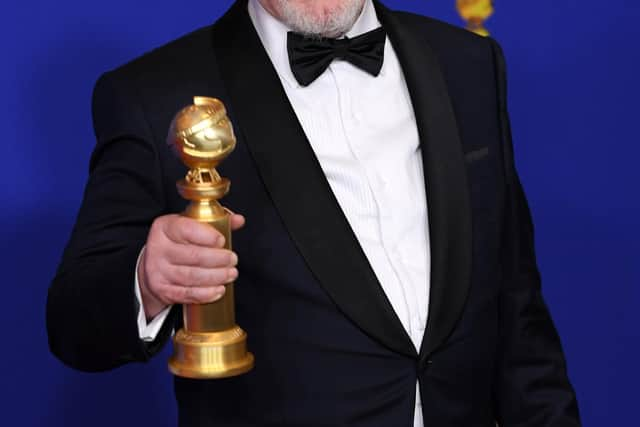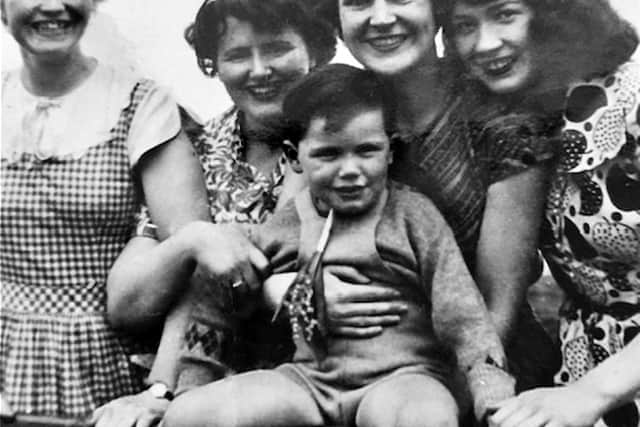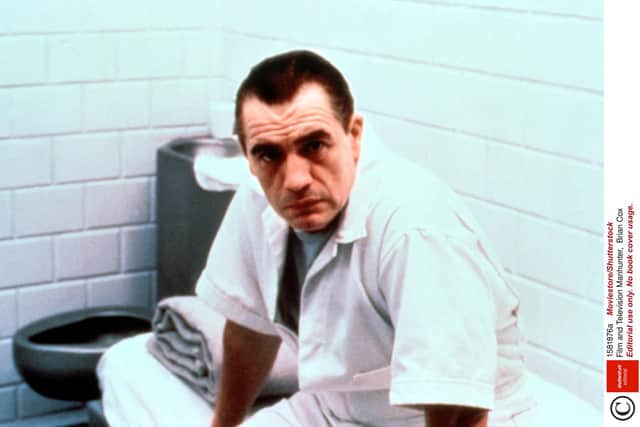Brian Cox on his autobiography Putting the Rabbit in the Hat and the new season of Succession


Brian Cox has presence. The last time I interviewed the Scottish star of stage and screen, just before his last film, Churchill, was released, even in the airy elegance of Edinburgh’s Balmoral Hotel Palm Court with its soaring ceilings, he quietly dominated the space. This might be intimidating were it not for the fact he is eloquently charming and courteous - and offered me one of his scones. There’s something disarming about watching a man who has played the gamut of powerful alpha male silverbacks, including media magnate Logan Roy in HBO’s Succession, Agamemnon, Titus Andronicus, Lear, Churchill, Picasso and Hannibal Lecter, gently brushing the sprinkling of excess sugar off the top of a cake before consumption.
This time round we talk over the phone so I can’t see the blue eyes that alternate between steely and twinkling but the distinctive voice is there, deep and resonant, punctuated by chuckles and puffs as he multitasks and signs 3,700 copies of his long-awaited memoir, Putting the Rabbit in the Hat.
As he discusses the book the voice roams among the could-go-either-way uh-huhs of his scary Succession character, the well-modulated tones of a trustworthy bank manager, actor-ese when talking about The Work and revels in a peppering of his native Dundonese patois, from ‘a hae ma doots’ (about God) to ‘it’s bra!’ (on the £6.5m grant recently awarded by the Scottish Government to his beloved King’s Theatre in Edinburgh for a revamp).
We have plenty to talk about as this is the week Cox gives us both barrels with the release of his autobiography, and a new series of the eagerly-anticipated HBO smash hit Succession.
Putting the Rabbit in the Hat is Cox’s way of answering “How does a wee kid from Dundee get to be in films?, and he charts his rise to stardom with tales, both sad and laugh out loud (such as the story of how he ended up not being called Colin), from a poverty-stricken childhood all the way to Hollywood. Raised by his elder sisters after his father died when he was eight and his mother’s mental health saw her hospitalised, he escaped into film and TV then lived, breathed and slept (at the) acting when he landed a job at Dundee Repertory Theatre as a teenager, setting him on the road to become the internationally renowned actor he is now at 75.
Cox has stories about many of those he has worked with, and that’s everyone from Gielgud and Olivier through a couple of Redgraves, Ian McKellen, Albert Finney, Peter O’Toole, Gary Oldman, Alan Rickman, John Osborne, Spike Lee, Ken Loach, Lauren Bacall, Keanu Reeves, Brad Pitt, Scarlett Johannson and Steven Seagal. He’s also starred in blockbusters such as Manhunter, Braveheart, The Bourne Identity, The Bourne Supremacy, X2: X-Men United, Red and Churchill, and he’s showing no sign of letting up as the small screen star of Succession has won him a whole new audience queuing up to ask him to tell them to ‘f*** off!’ a la Logan Roy.
Filled with a lifetime of stories and revelations about his shortcomings as well as successes, the book is a great read, not least because Cox is forthright in his opinions and has a witty tongue in cheek tone, but was he totally honest, or did he pull his punches?


“I think if you’re going to do something like that you really have to tell the truth. Shoot the devil. It was cathartic, necessary. It was important for me because I’ve reached a certain age and I wanted to look at certain things in the light of one’s experience and be as truthful as I could be. Of course there are things I left out, and also have I been fair, particularly to the incredible women in my life? He says.
“And the other thing is, have I told the truth? Have I made it all up? You start getting panics about it. Am I being unfair to people, am I being unkind? There were all kinds of strange emotions come up in the course of writing this book.”
Cox explains that it’s also not just a case of mis-remembering or forgetting, but also of not knowing things in the first place as he discovered after the book was printed.
“I found out the other day - I have a house in London I used to live in and now rent out, and my tenant found a tiny, slightly battered handbag of my mother’s, probably dating from the thirties, and inside was an excerpt from her diary which she wrote about four days after my father was buried and I hadn’t seen until now. It was just incredibly moving, trying to make sense of their life together. And then last night I found this thing I’d written about [fellow Scottish actor and mentor] Fulton Mackay, and I was moved by that. It was much better than anything I’d written in the book!” he laughs. I realised it was written just after he passed away and it was about the effect he had on me and the positivity he had, and I thought oh Jesus, have I given Fulton enough justice in the book? If I had a second edition I would certainly put this in.”


For Cox the process of writing the book was emotional, especially the parts about his parents, which he expected, but he was taken aback by his feelings when it came to writing about his elder brother.
“Everyone was worried about me when my father died as I was the eight-year-old, but actually my brother was 16 and in a far more vulnerable position than I was and I only realised that in writing the book, so that caught me. He ran off to the army and lived his life, and he’s got grandchildren and great-grandchildren, quite a flock, which is powerful because I don’t have a single grandchild.”
As Cox puts it, his “upbringing is so much a part of me it’s written through me like words through a stick of rock” and his early struggles in Dundee have shaped him, giving him a sense of purpose but also a life-long insecurity, even now he’s financially secure.
“It still hangs over me,” he says. “But my purpose is still there. And I have learned to become more detached from things as I get older because once you’re attached to something it’s not very healthy. I don’t believe in God, a hae ma doots, but the phrase is ‘let go, let God’ and I understand what that means, because it’s analogous to not holding on to things, letting things take their course.


“But I still have issues with poverty. It will always hang over me like a damoclean sword and that doesn’t go away. I’m a workaholic, and the reason I’m a workaholic is because I think I can’t afford not to work, you know?” He laughs, acknowledging that he could probably afford to take his foot off the gas, but won’t.
“Once you’ve got the bug, you’ve got the bug. It’s very hard to throw it off. It’s just me. I’ve got this CRAZY schedule that I’m trying to fulfil at the moment, and it is driving me NUTS! But it’s part of who I am. Warts and all, this is me.”
Warts and all recently won him a Golden Globe for best actor in a television drama series for the role of Logan Roy, but he said of his 2017 film Churchill, he “was robbed” referring to Gary Oldman’s very different portrayal in winning the 2018 Oscar.
“Nah, it was a little bit tongue in cheek,” he says. “It’s known as The Curse of Brian Cox. I got the Golden Globe recently and it was lovely, but you can’t take them seriously. You cannot live your life by Oscars and stuff like that otherwise you’ll go nuts. You’d go absolutely mental. It’s about The Work and it’s always about The Work. But it’s good to get recognised and you do get pissed off if people don’t recognise the work or give it the credence I think it deserved.
“What I thought was so great about Churchill was the fact I was working with one of the great, great actresses, Miranda Richardson… and we had this great relationship and it was the Clem/Winston relationship which really affected me. I thought it was more peaceful. I thought that other film was kind of a load of bollocks quite frankly. Gary did a great job, but he used makeup and did all the things I didn’t think needed to be done. Certainly I didn’t, although I put on the weight which I’m always quite happy to do!” He laughs.
While he nominates his greatest theatrical experience as being playing Titus Andronicus with the RSC in the late 1980s, with Logan Roy and Succession has come even more widespread recognition, particularly among the younger generation who have watched the menacing media mogul battle his family through two successful series, and it’s this role that people in the street want to talk to him about.


“They all want you to tell them to f** off,” he says and laughs. “I was playing Lyndon Johnson in the theatre [on Broadway in 2019] and there were these kids, young couples with the phones and they said ‘Mr Cox, could you tell me and my boyfriend to f*** off please?’ Sure. ‘Are you ready, ok, fuck off!’
In his book Cox jokes about his sense of disgust in the human condition and the way it’s turned out, as well as his desire to instil a sense of self-worth in his children - he has a grown up son and daughter by his first wife and two sons with his second. Are these sentiments something he has in common with Logan Roy?
“I’m very empathetic towards Logan,” he says. “Even though he’s an absolute bastard, there are understandable reasons for being an absolute bastard. It’s not a road that I would go down, it’s not my world, but in defence of him, he is just very disappointed.
“We are part of an extraordinary ongoing experiment and in a state of evolution, living longer, all kinds of things are happening in a way that we never thought of a thousand years ago, but we are in a time when we are also incredibly stupid about things, and it’s very disappointing. I think Logan feels it very acutely. It’s more abrupt with him. He isn’t optimistic, whereas I’m quite optimistic by nature. But where we agree is that the human race is falling and it hasn’t got very far to go. Especially with the Eton Clown and The Big Pinocchio From Across The Water that have been at it for years with the lying, and the moral malaise that we’re in, so yeah, to a certain extent I think we’re in a pretty shitty state. But again, there’s a rainbow, and light at the end of the tunnel, if you’ll pardon me for mixing my metaphors, and in that sense, things are fine, they’ll sort themselves out.”
With season three of Succession now underway, will we see Roy beasting his children once more in a bid to make them worthy of succeeding him?
“You know you’re looking to your children to be them themselves. You don’t want them to be copies of you or their mother, and of course it’s infuriating too. But the Roy children are so cursed by entitlement. They’ve had this luxurious life for far too long and they’ve never suffered any kind of hardship - they’ve suffered emotional hardship, but not financial hardship - and they’ve been incredibly blessed, and that’s the difficulty Logan is dealing with. It’s how are these kids going to get into reality, but of course the world isn’t real, it’s sort of fantastical and it’s very hard for them. It’s hard for a cry-baby like Kendall. Uh-huh.”
As for his own parenting, with Cox able to be around more with his younger children, and by his own confession not having been a great father first time round, does he feel more confident in the role nowadays?
“No, it’s still suck it and see,” he laughs. “I’m kind of make it up as you go along, because the problem is when you have a father like mine, it’s very hard to know how to be a father because he was like a saint, an extraordinary man. My mother used to say, ‘he’s no real’. I keep his photograph, one here [London] and one in New York and it’s my favourite. I’ve included it in the book, him doing my wee buttonhole and sitting on my trike and just being there. It’s just the care and the attention and the love and you go wow, you can’t bottle that. “
Cox’s father ran a grocer’s shop but his generosity with his customers meant when he died his wife and family suffered financial hardship.
“He just allowed people to be who they were and it was painful for my mother to see him being taken advantage of, but my father never saw it, would not buy into any of that. He was an incredibly admirable human being and I’m so lucky to be his son and so lucky to be her son as well because of the balance. She had a clear understanding and vision of the world. Her attitudes, her sayings, are still so absolutely on the money. She’d say: ‘what’s for you won’t go by you’ and ‘Brian, it’s just a play’, ‘It’s just a film’. He laughs.
Putting the Rabbit in the Hat? His mother would probably say, ‘it’s just a book’. But there’s a lot more to it than that. In fact it’s bra. And so is Succession. Uh-huh.
Putting the Rabbit in the Hat - My Autobiography by Brian Cox is published by Quercus in hardback, e-book and audio, 28 October 2021, hardback, £20
Succession is on Sky Atlantic and NOW now. [from 18 Oct]
Read More
A message from the Editor:
Thank you for reading this article. We're more reliant on your support than ever as the shift in consumer habits brought about by coronavirus impacts our advertisers.
If you haven't already, please consider supporting our trusted, fact-checked journalism by taking out a digital subscription.